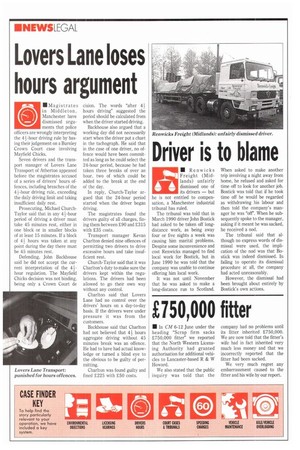Lovers Lane loses hours argument
Page 16

If you've noticed an error in this article please click here to report it so we can fix it.
/Magistrates in Middleton, Manchester have dismissed arguments that police officers are wrongly interpreting the 44,-hour driving rule by basing their judgement on a Burnley Crown Court case involving Mayfield Chicks.
Seven drivers and the transport manager of Lovers Lane Transport of Atherton appeared before the magistrates accused of a series of drivers' hours offences, including breaches of the 4i-hour driving rule, exceeding the daily driving limit and taking insufficient daily rest.
Prosecuting, Michael ChurchTaylor said that in any z“-hour period of driving a driver must take 45 minutes rest, either in one block or in smaller blocks of at least 15 minutes. If a block of 4i hours was taken at any point during the day there must be 45 minutes rest.
Defending, John Backhouse said he did not accept the current interpretation of the 4ihour regulation. The Mayfield Chicks decision was not binding, being only a Crown Court de cision. The words "after 41 hours driving" suggested the period should be calculated from when the driver started driving.
Backhouse also argued that a working day did not necessarily start when the driver put a chart in the tachograph. He said that in the case of one driver, no offence would have been committed as long as he could select the 24-hour period, because he had taken three breaks of over an hour, two of which could be added to the break at the end of the day.
In reply, Church-Taylor argued that the 24-hour period started when the driver began driving.
The magistrates found the drivers guilty of all charges, fining them between £90 and £315 with £35 costs.
Transport manager Kevan Charlton denied nine offences of permitting two drivers to drive excessive hours and take insufficient rest.
Church-Taylor said that it was Charlton's duty to make sure the drivers kept within the regulations. The drivers had been allowed to go their own way without any control.
Charlton said that Lovers Lane had no control over the drivers' hours on a day-to-day basis. If the drivers were under pressure it was from the customers.
Backhouse said that Charlton had not believed that 4i hours aggregate driving without 45 minutes break was an offence. He had to have had actual knowledge or turned a blind eye to the obvious to be guilty of permitting.
Charlton was found guilty and fined £225 with £50 costs.




























































































